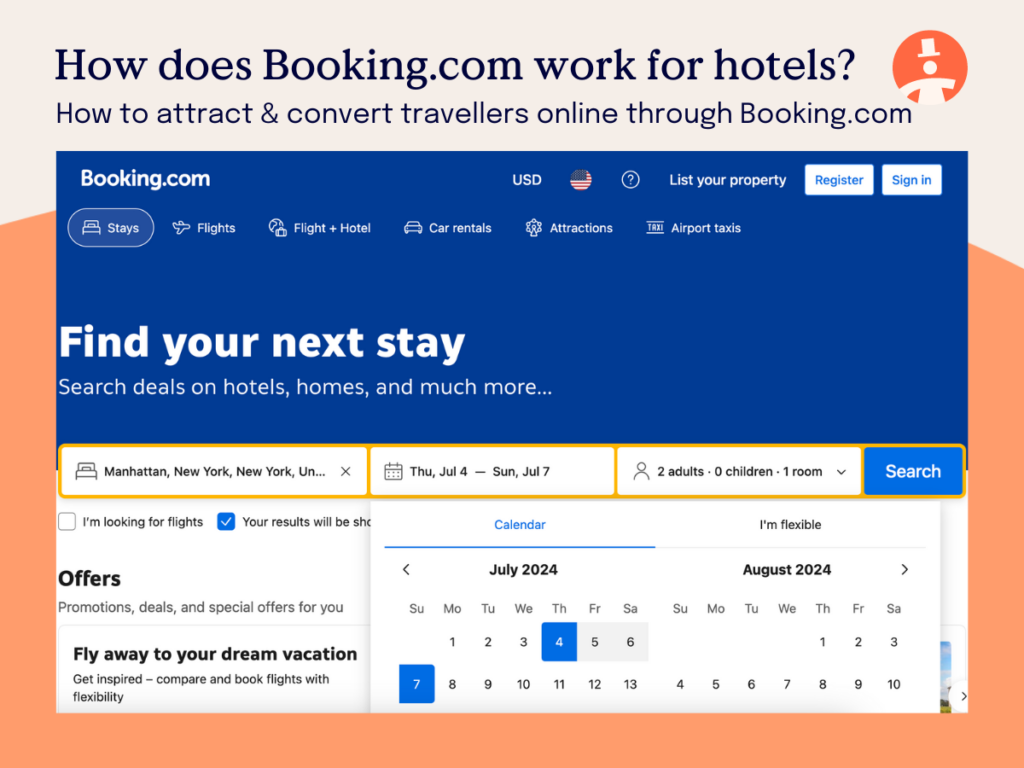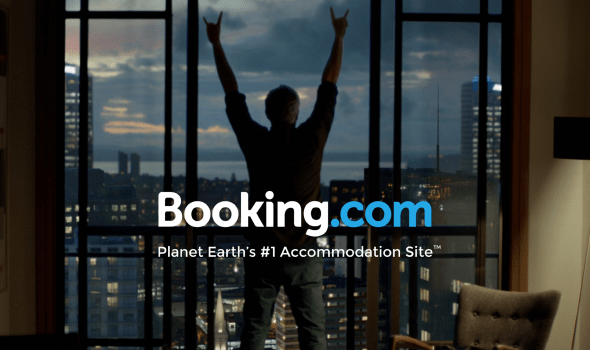What is Booking.com?
Booking.com is an online platform where hotels and other types of accommodations make their rooms available to travelling guests from all over the globe. The channel will also help to facilitate the resulting reservations but takes a commission fee from the revenue the hotel earns.
Unlike most competitors in the online reservation sector, Booking.com allows their accommodation partners to manage their own relationships with customers. The Booking.com business model delivers its service according to an ‘intermediary model’, meaning that:
- Properties remain the sole vendors of their own services.
- Prices are set exclusively by property owners, who enter and update them directly on the Booking.com platform via an extranet.
- Guests generally pay for their rooms at the property once they’ve completed their stay.
This differs from the ‘merchant model’ used by many other providers, in which case the provider buys rooms from hotels and other accommodation types and sells those rooms on to customers, on the provider’s terms. Independent hotels and other accommodation types tend to prefer Booking.com’s approach over the traditional merchant model, which limits their flexibility.
Over time, many small accommodation providers wonder how Booking.com can further help them to get more online reservations for their bed and breakfast, inn, or guest house.
This blog will discuss everything small hoteliers need to know about Booking.com and how to maximise the platform for winning more direct bookings.
Who owns Booking.com?
Booking.com was founded in the Netherlands 1996, and quickly grew a loyal following. In 2005 Booking.com was acquired by US-based Priceline Group for $133 million. The group has since changed its name to Booking Holdings.
Booking Holdings is a huge player in the travel space, owning some of the world’s biggest online travel agencies, hotel booking sites and metasearch engines, including Booking.com, Priceline, Agoda, Kayak, Momondo, Cheapflights, Rentalcars.com and OpenTable.

Is Booking.com reliable for hotels?
Is Booking.com legit for hotels? The short answer is yes. Booking.com allows consumers worldwide to compare and choose between over 650,000 different accommodations, including hotels, resorts, villas and guest houses. All accommodations, big or small, can sell rooms through Booking.com for a reasonable cost.
Each of their hotel partners receives:
- Listing on an online reservation system accessible 24/7 everywhere in the world.
- A description on both the website as well as the various mobile apps of their property and services in up to 42 languages, giving a global reach otherwise impossible for many properties.
- Powerful online marketing tools to increase their visibility to a global audience.
- Verified consumer feedback in the form of reviews (about 70 customer reviews per accommodation on average).
- Access to new emerging distribution channels, such as mobile apps.
How does Booking.com work for hotels?
Let’s look specifically at how booking.com works for hotels. A hotel is responsible for creating its own listing on Booking.com. We’ve described the complete process of how to list your property here, but the basic steps are as follows:
- Register with the platform
- Verify your location
- Add photos and information to your listing
- Outline your policies and payment options
- Go live
Keep in mind that your Booking.com listing should never be considered ‘complete’. You should continue to optimise it to make it more alluring to potential guests, including curating and responding to reviews, uploading professional photos, and adding any extra services or amenities that you now boast at your property.
Once you begin to take bookings, Booking.com works like any other OTA: it introduces your hotel to a far larger audience, and helps you to secure more bookings.
What is the Booking.com commission rate?
The Booking.com business model is commission-based. The Booking.com commission – the cut the platform takes for facilitating each booking – is generally 15%, although it may be as low as 10% or as high as 20% in certain situations.
You will pay Booking.com its commission after your guest has checked out and paid. You will be issued a monthly commission invoice that tallies up the total eligible reservations from the previous month. This helps with cash flow, as the guest will have always paid before you are charged by Booking.com.
Booking.com key features and tools
There’s a reason Booking.com is one of the largest online travel agencies in the world. It offers a number of high-end and often unique features for hotels and users alike.
Search filters: Booking.com allows users to customise results by price, location, accommodation type, guest rating, amenities and more. You can also sort your results any number of ways, including in unique ways like ‘best reviewed and lowest price’, and ‘distance from place of interest’.
Guest reviews: User-generated reviews form a key function on Booking.com, helping users to make more informed decisions based on the experiences of other guests. By regularly replying to reviews in the right way, a hotel can get this feedback working for them.
24/7 support: Both users and hotels enjoy round-the-clock support from Booking.com via phone, email, or online chat.
Booking.com extranet: The extranet is a place where accommodation providers can take total control of their listing and general Booking.com presence.
How to attract and convert travellers online through Booking.com
One of the biggest online reservation tips Booking.com offers is to provide excellent photographs of your property. They have seen that properties with great pictures get higher click-through rates and conversions.
Booking.com usually asks their hotel partners to provide them with at least 24 pictures that include a bed, bathroom, lobby and other facilities and they should be at least 2048 x 1536 pixels.
Small accommodation providers need to remember that the better the service at the hotel, the better the guest review will be, which in turn will help give their hotel a higher Booking.com ranking.
Also, Booking.com provides certain options to help a property get more customers over the line.
Secret Deals is an option that allows their hotel partners to offer deals to an exclusive and loyal group of Booking.com customers across various channels including Booking.com account holders, newsletter subscribers and all mobile app users.
Booking.com traveller trends for small accommodation businesses
Mobile is transforming the travel industry by allowing bookers to be increasingly spontaneous in planning their accommodations. Booking.com has seen a steady increase in mobile bookings overall and particularly in last minute bookings made via mobile.
This led them to develop their new app called Booking Now, which allows customers to find accommodation that suits their specific preferences in any location within 48 hours of staying there. Booking.com saw that more than half of all bookings within 48 hours were made via mobile.
It is therefore important for small hotels to ensure their availability and prices are kept up-to-date on Booking.com in order to meet the demand of customers who are booking spontaneously, no matter what platform they book from.
How can Booking.com assist small accommodation owners with their overall distribution strategy?
Small, independent hoteliers simply can’t compete with larger chains when it comes to marketing budget, which means they can struggle to match the reach of their larger competitors.
Booking.com helps to level the playing field. Small hotels are placed right alongside big name hotels, and consumers can make their choice on relevant factors like price and guest reviews.
In this way Booking.com and other OTAs form a key part of an independent hotelier’s distribution strategy. The aim is to offer bookings in as many places as possible, from your direct booking website, to OTAs, to GDSs, and as one of the largest hotel booking sites on earth, Booking.com grants a hotelier access to more potential guests than most.
Is Booking.com as reliable as Little Hotelier for small hotels?
Is Booking.com reliable for hotels? It is, but only to a point. Ultimately you are always reliant on the platform to deliver you new guests, and you’ll pay a significant commission in the process. But there is another way.
What if, instead of channelling guests through an OTA, you allowed them to book directly with you. What if you kept that 10%, 15%, 20% OTA commission, while also earning up to 46% more bookings and 43% more revenue, and enjoying far more control over your online presence. All this is possible with Little Hotelier’s direct booking engine.
- Easy integration: Our direct booking engine can easily be integrated into your current site. Alternatively you can use the Little Hotelier website builder to construct a direct booking website from the ground up in less than an hour!
- Increase reservation value by upselling: Allow guests to add extras and packages during the booking process to increase the value of every reservation you earn.
- Connect more deeply with guests: By bringing the booking process under your control, you can ask your guests the questions you want to ask, get to know them, personalise the experience to them, and turn them into loyal return customers.
By Dean Elphick
Dean is the Senior Content Marketing Specialist of Little Hotelier, the all-in-one software solution purpose-built to make the lives of small accommodation providers easier. Dean has made writing and creating content his passion for the entirety of his professional life, which includes more than six years at Little Hotelier. Through content, Dean aims to provide education, inspiration, assistance, and, ultimately, value for small accommodation businesses looking to improve the way they run their operations (and live their life).
Table of contents
“Direct bookings immediately deduct deposits via Little Hotelier mobile app. The payment mechanism also allows quick and easy credit card deductions!”
Farm Manager, Manna Hill Farm








